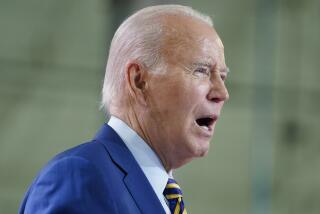Bill Clinton offers case for Obamacare: ‘We’ve got to do this’
Opening a new phase of the White House campaign to sell the public on the nation’s new healthcare program, former President Clinton sought to clear up confusion about it Wednesday and called on the law’s opponents to help smooth its implementation for the good of their constituents.
“We’ve got to do this,” Clinton said in a speech to several hundred healthcare professionals and doctors in Little Rock, Ark. “The studies show that we are No. 1 by a country mile in the percentage of our income that we devote to healthcare costs, and rank no better than 25th to 33rd in the healthcare outcomes we get. This is the country that pioneered innovation in every other area of our national life; you cannot make me believe that we have to tolerate this from now until the end of eternity.”
At a crucial juncture a few weeks before the Oct. 1 opening of the law’s health insurance marketplaces across the country, Clinton scolded Republicans who have voted to repeal the law more than 40 times, arguing that they have not offered “real alternatives.”
“The benefits of reform can’t be fully realized, and the problems certainly can’t be solved unless both the supporters and the opponents of the original legislation work together to implement it and address the issues that arise whenever you change a system this complex,” he said during Wednesday’s address at the Clinton Presidential Library.
After a dry recitation of the benefits of the law that have already been put in place and the expansion of insurance coverage to come, he argued that “the direst predictions for the adverse consequences have not materialized.”
Healthcare inflation has slowed in the last few years, he noted. He chided states that have rejected federal aid for Medicaid expansion, pointing out that their “tax money is going to be spent in other states.”
He cited a study by the Commonwealth Fund that indicates that healthy young people – whose participation will be a key factor in determining whether the law succeeds – will sign up, adding that if they can afford to buy coverage, they should because “it’s both the right and the smart thing to do.”
Despite fears that many businesses would shift full-time workers to part-time work to shirk healthcare requirements, Clinton asserted that “hasn’t happened” yet, and that 90% of employment gains in the U.S. since 2010 have been full-time jobs.
Clinton said that after a similar law was implemented in Massachusetts under the state’s former governor, Mitt Romney, “there was no appreciable impact on job growth, the percentage of part time workers or employers dropping coverage.”
The White House enlisted Clinton as its first official speaker in a series intended to get the public focused on the implementation of the new law once open enrollment starts on Oct. 1.
Clinton lived up to his title, which President Obama joked last year should be “the Secretary of Explaining Stuff,” but the speech was more professorial than impassioned -– despite Clinton’s long history of working on healthcare access both as president and through his foundation.
With Republicans pouncing on any twist or difficulty with the new law, its success or failure could affect the potential 2016 presidential campaign of Hillary Rodham Clinton, who did not attend her husband’s speech Wednesday. Hillary Clinton was the major force behind an unsuccessful healthcare reform effort during her husband’s first term.
The administration has a difficult task ahead in selling the public on the new law given its unpopularity and confusion about its effect. In a recent survey by the Kaiser Family Foundation, four in 10 people believed the law had been repealed or overturned — or were unsure about whether it remained in place. About 50% of those who responded said they didn’t know how it would affect their families.
In addition to Clinton, the White House has recruited artists and celebrities to help publicize the law’s benefits, particularly for young people aged 18-35, who are a key enrollment target. The website Funny or Die is working on a series of videos to attract attention to the law among young voters.
Administration officials are also working directly with key constituent groups including Latinos and African Americans to encourage them to sign up for coverage.
Clinton said Wednesday in Little Rock that the law had already done “a lot of good.”
“We all get paid to show up for work and we need all hands on deck here,” the former president said. “The health of our people, the security and stability of our families, and the strength of our economy are all riding on getting healthcare reform right and doing it well. That means we have to do it together.”
Twitter: @MaeveReston
[For the record, Sept. 4, 1:38 p.m.: An earlier version of this post incorrectly referred to the Commonwealth Fund as the Commonwealth Foundation.]
More to Read
Get the L.A. Times Politics newsletter
Deeply reported insights into legislation, politics and policy from Sacramento, Washington and beyond. In your inbox three times per week.
You may occasionally receive promotional content from the Los Angeles Times.







